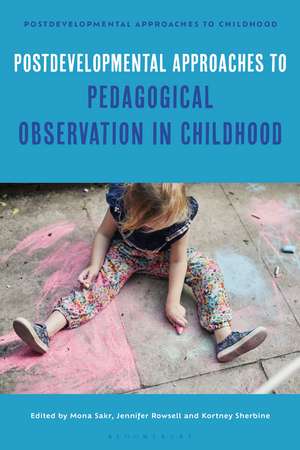Postdevelopmental Approaches to Pedagogical Observation in Childhood: Postdevelopmental Approaches to Childhood
Editat de Dr Mona Sakr, Professor Jennifer Rowsell, Kortney Sherbineen Limba Engleză Hardback – 20 sep 2023
Preț: 539.00 lei
Preț vechi: 773.20 lei
-30% Nou
Puncte Express: 809
Preț estimativ în valută:
103.15€ • 107.08$ • 86.01£
103.15€ • 107.08$ • 86.01£
Carte tipărită la comandă
Livrare economică 24 martie-07 aprilie
Livrare express 14-20 februarie pentru 124.04 lei
Preluare comenzi: 021 569.72.76
Specificații
ISBN-13: 9781350369641
ISBN-10: 1350369640
Pagini: 224
Ilustrații: 10 bw illus
Dimensiuni: 156 x 234 x 18 mm
Greutate: 0.47 kg
Editura: Bloomsbury Publishing
Colecția Bloomsbury Academic
Seria Postdevelopmental Approaches to Childhood
Locul publicării:London, United Kingdom
ISBN-10: 1350369640
Pagini: 224
Ilustrații: 10 bw illus
Dimensiuni: 156 x 234 x 18 mm
Greutate: 0.47 kg
Editura: Bloomsbury Publishing
Colecția Bloomsbury Academic
Seria Postdevelopmental Approaches to Childhood
Locul publicării:London, United Kingdom
Caracteristici
Draws on a range of theories including feminist new materialism, social semiotics, and sociocultural and multimodal approaches
Notă biografică
Mona Sakr is Associate Professor of Early Childhood at Middlesex University, UK.Jennifer Rowsell is Professor of Digital Literacy at the University of Sheffield, UK.Kortney Sherbine is an independent researcher in Pittsburgh, Pennsylvania, USA.
Cuprins
Series Editor's PrefaceIntroduction, Mona Sakr (Middlesex University, UK), Jennifer Rowsell (University of Bristol, UK) and Kortney Sherbine (Utah State University, USA)1. Posthuman Perspectives on Childhoods and Classroom Observation, Kortney Sherbine (Utah State University, USA)2. Togetherness in Early Childhood Art: Observation With Young Children, Shana Cinquemani (Rhode Island School of Design, USA)3. Movements, Synchronicities, Choreographies: Attuning to Young Children's Drawing, Sylvia Kind (Capilano University, Canada)4. Hacking observational Literacy Tools in Early Childhood Education, Karen Nociti and Mindy Blaise (Edith Cowan University, Australia) 5. Reconceptualising Observations with Infants and Toddlers: Perspectives from Aotearoa, New Zealand, Kiri Gould, Marek Tesar and Jen Boyd (University of Auckland, New Zealand)6. Speculative Routes to Observation in Early Art Teacher Education, Christopher M. Schulte (University of Arkansas, USA)7. Exploring Children's Material/Digital/Analogue Engagements Through Intergenerational Research, Mark Shillitoe (International School Delft, the Netherlands) and Harriet Hand, Jennifer Rowsell, Scarlett Shepherd and William Squire (University of Bristol, UK)8. Hidden Mothering and Mutated Modest Witnessing with Hop(scotch) Studio, Marissa McClure Sweeny (Indiana University of Pennsylvania, USA) 9. Posthuman Babies: Reconceptualizing a Baby's First Year, Sara Sintonen and Alexandra Nordström (University of Helsinki, Finland)10. Experimental Analysis of Photography and Video in Postdevelopmental Observations of Early Childhood Art in the Family Home, Mona Sakr (Middlesex University, UK)Conclusion, Mona Sakr (Middlesex University, UK), Jennifer Rowsell (University of Bristol, UK) and Kortney Sherbine (Utah State University, USA)ReferencesIndex
Recenzii
This book offers a way of progressing children's learning by tuning in to children, identifying their broader interests through 'noticing', rather than looking for a particular developmental milestone. It deliberately shies away from the mundane and limiting focus on literacy, foregrounding the power of creativity in developing the whole child. The language used is accessible yet professional, recognizing the potential of early childhood professionals to push beyond the boundaries of policy, restrictive practices and deterministic developmentalism. The pedagogy of 'sparks, pulses and flows' is empowering, and is explained and explored with good examples to support practitioners in challenging their pedagogy.
This book will be an invaluable resource. It pursues, challenges and deconstructs predominant and traditional ideas surrounding 'observations.' Such ideas are predicated and supported by developmental psychology and can as a consequence lead to the toxic consequences of 'normalising' some children whilst others are seen as deficit. An engagement with this book will alter what is means to observe and in so doing will be a step closer to more equitable ways of observing.
This book will be an invaluable resource. It pursues, challenges and deconstructs predominant and traditional ideas surrounding 'observations.' Such ideas are predicated and supported by developmental psychology and can as a consequence lead to the toxic consequences of 'normalising' some children whilst others are seen as deficit. An engagement with this book will alter what is means to observe and in so doing will be a step closer to more equitable ways of observing.


